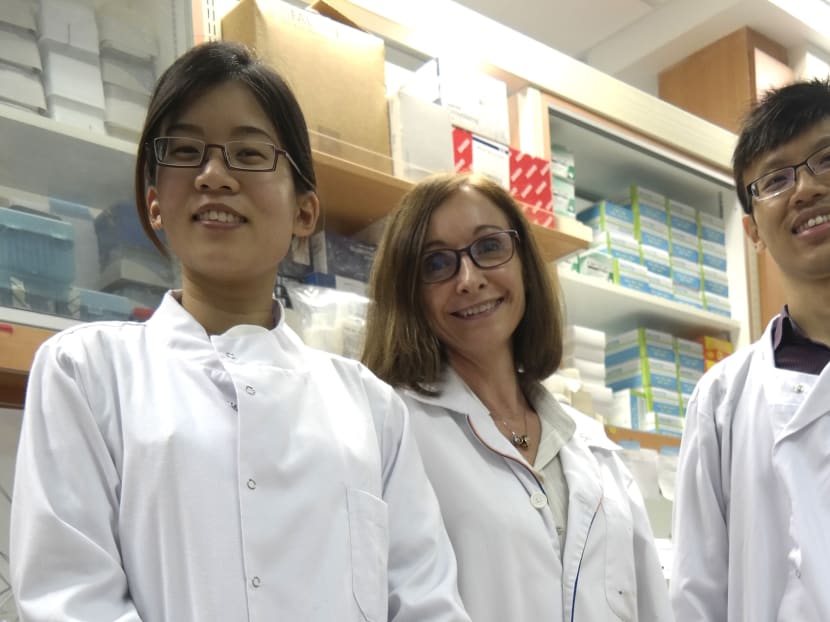Mother’s antibodies may worsen dengue infection in baby
SINGAPORE — Antibodies from a dengue-vaccinated mother can protect her baby against dengue virus infection, but they could also worsen the virus or affect the baby’s immunisation.

Part of the National University of Singapore research team that found out how a dengue-vaccinated mother’s antibodies could worsen dengue infection in their babies: (From left to right) Ms Lee Pei Xuan, Associate Professor Sylvie Alonso and Mr Benson Chua. Photo: NUS
SINGAPORE — Antibodies from a dengue-vaccinated mother can protect her baby against dengue virus infection, but they could also worsen the virus or affect the baby’s immunisation.
Questions on what happens to babies of women who have been immunised have only surfaced in recent years, after Dengvaxia, the world’s first dengue vaccine against all four serotypes of the virus, hit the market.
Using mice, four scientists from the National University of Singapore answered some of these questions in a research paper published last month in the scientific journal JCI Insight.
Dengue is endemic in Singapore and dominated by the DENV-1 and DENV-2 serotypes here.
When a baby contracts a dengue strain very similar to the vaccine strain, the maternal antibodies received from the mother during gestation or breastfeeding will protect against it. These maternal antibodies will wane after about six months.
However, the antibodies will not protect the baby against dengue strains that are different from the vaccine strain. They could even worsen the virus, leading the baby to develop more severe forms of the disease, such as dengue haemorrhagic fever or dengue shock syndrome.
Maternal antibodies can also prevent babies from producing antibodies of their own after being vaccinated, the scientists found.
Another type of dengue vaccine currently undergoing clinical trials holds promise.
Unlike Dengvaxia, which triggers an antibody response, the vaccine triggers a T-cell response, which is the other arm of the immune system. T-cells attack infected cells and trigger a mechanism that makes them die.
The team used the DENVax vaccine developed by pharmaceutical company Takeda and found that it provided broader protection by protecting baby mice against dengue strains that are different from the vaccine strain.
But vaccines that trigger a T-cell response are more costly and time-consuming for drug companies to produce. They require fancier equipment and longer analysis of samples during clinical studies, noted Associate Professor Sylvie Alonso, the research team leader.
“We hope that our work will further convince the dengue vaccine community that it is of utmost importance to include a protective T-cell response in their vaccine design,” she said.
While the team focused on the dengue virus, Assoc Prof Alonso said that their findings can apply to vaccines for other viruses as well.
Professor Paul Tambyah, a senior consultant at the National University Hospital’s Division of Infectious Diseases, said the findings emphasise the fact that doctors cannot just look at one measure, such as antibody levels, to ensure vaccinated individuals are truly protected from infection.
“It would be unfortunate if a vaccine actually made the situation worse by triggering one part of the immune system to overreact instead of completely eliminating the virus,” he said.
Dengvaxia has been embroiled in controversy after Sanofi Pasteur said recently it could cause severe disease in those who did not previously have dengue. Philippine regulators stopped the sale and distribution of the drug last month.
Dengvaxia became available in Singapore last year. In the wake of Sanofi Pasteur’s announcement, the Health Sciences Authority said it would strengthen the warnings and recommendations for prescription of the vaccine and closely monitor it to ensure its continued safety and efficacy.








